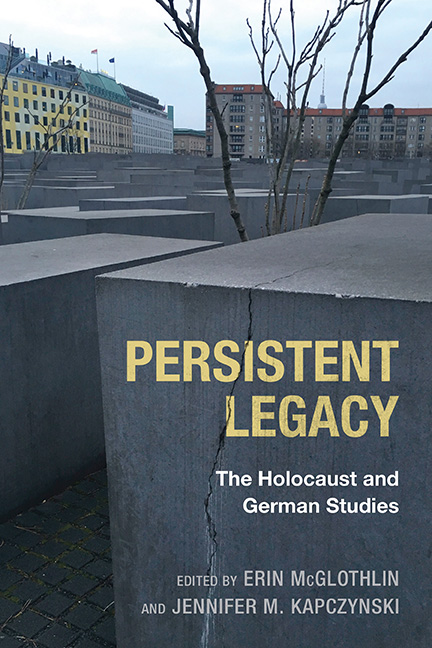Book contents
- Frontmatter
- Contents
- Acknowledgments
- Introduction
- Part I Abiding Challenges
- Part II The Holocaust in German Studies in the North American and the German Contexts
- Part III Disentangling “German,” “Jewish,” and “Holocaust” Memory
- Part IV Descendant Narratives of Survival and Perpetration
- Part V Remediated Icons of Memory
- Part VI Holocaust Memory in Post-Holocaust Traumas
- Notes on the Contributors
- Index
Introduction
Published online by Cambridge University Press: 17 June 2021
- Frontmatter
- Contents
- Acknowledgments
- Introduction
- Part I Abiding Challenges
- Part II The Holocaust in German Studies in the North American and the German Contexts
- Part III Disentangling “German,” “Jewish,” and “Holocaust” Memory
- Part IV Descendant Narratives of Survival and Perpetration
- Part V Remediated Icons of Memory
- Part VI Holocaust Memory in Post-Holocaust Traumas
- Notes on the Contributors
- Index
Summary
I.
THE PURPOSE OF THIS VOLUME is to assess the manifold ways in which German studies today engages with the Holocaust and its legacy. Although from the vantage of today, the validity of the Holocaust as a subject in German studies may seem obvious, it has by no means always been a given that North American Germanists should pay deliberate attention to representations of the Nazi genocide, in either their scholarship or their teaching. In fact, the development of this disciplinary focus has a long and complex history that continues to unfold today. While it is not possible to locate the origins of this engagement in a single catalyzing moment or figure, one important starting point is the publication in the Autumn 1978 volume of Unterrichtspraxis of an article entitled “The Germanist and the Holocaust.” Written by University of Massachusetts in Boston scholar Alfred Hoelzel (1934–96), the article urges university-level instructors of German to offer general education courses about the Holocaust taught in English using chiefly literary texts. “We Germanists,” Hoelzel writes, “have a special expertise—and, therefore, a special responsibility—for teaching the Holocaust.” With this statement, Hoelzel, an Austrian-born Jew who fled Nazi persecution in 1939, argues for a deliberate and targeted introduction of Holocaust studies to the general university curriculum in the United States and elsewhere; moreover, he makes the case that Germanists, in their role as interpreters of German history and culture, are precisely the people to accomplish such a task. He maintains that scholars of German are especially poised to offer a critical introduction and evaluation of the events and experience of the Holocaust by virtue of their expertise with imaginative literature, which, according to Hoelzel, “cuts through the data, logic, and empirical evidence of the historian and the social scientist to mediate a more direct, intuitive understanding of truth and reality—particularly the inner reality of the psyche, of emotion, and of human interactions.” In addition to possessing unique facility with this material, Germanists bear a particular duty in the classroom to address the cultural products and legacy of Nazism and the Holocaust, something Hoelzel notes that his colleagues are hesitant to do or often even resist outright, preferring to focus instead on the crowning achievements of German culture.
- Type
- Chapter
- Information
- Persistent LegacyThe Holocaust and German Studies, pp. 1 - 16Publisher: Boydell & BrewerPrint publication year: 2016

